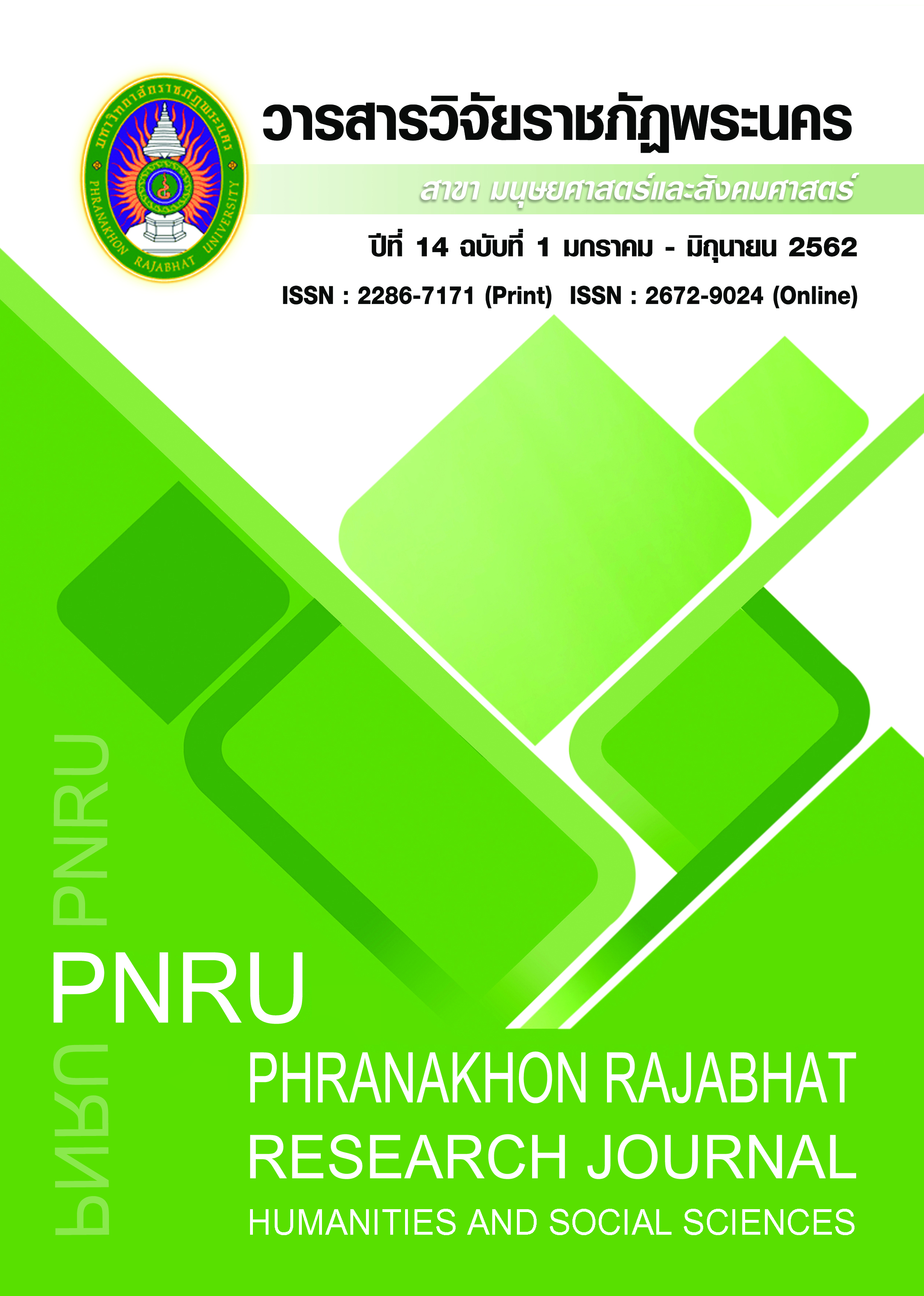BREAKING CRISIS OF TRAVEL AGENCIES WITH INNOVATION THEORY
Main Article Content
Abstract
Tourism industry is dramatically grown up and enhances Thailand’s economic. However, the growth of tourism industry in the mobility of globalization affects travel agencies which have been replaced by Online Travel Agency (OTA) because of the alternating of technology and the tourists’ behavior quickly switching. Government identifies the vision of Thailand to be Thailand 4.0 that focusing on, economy reform by innovation driving, management via technology. Government sector gives the assistance towards business owners in Small and Medium Enterprises (SMEs) for potential of organization by developing and emphasizing on research in organization. Including, encourage the quality of employees by focusing on competency development in skills, knowledge and attitude. The academic article aims to present the concept and innovation theory to travel agencies which travel agencies are able to adapt with company’s context to be survived in the globalization. Thus, the travel agencies can intergrade concepts and innovation theory in 6 dimensions: Product Innovation, Process Innovation, Management Innovation, Business Model Innovation, Marketing Innovation and Technology Innovation in order to be compatible with the fluctuation of tourists’ behavior in Thailand.
Article Details
Each publish articles were copyright by Phranakorn Rajabhat University
Any contents which appeared in each articles in the journal were authors personal opinion. It did not relate to Phranakorn Rajabhat University and other instructors in the university. Each authors would take responsibility on their articles. If there are any mistake, the authors will take responsibility themselves
References
Cheung, R. & Lam, P. (2009). How travel agency survive in e-Business world? Communications of the IBIMA. 10, 85-92.
Cittangwattana, B. (2012). Travel agencies. 2th Editions. Bangkok: Thammasarn. (In Thai)
Daft, R.L. (2013). Understanding the theory & design of organization. South-Western: Cengage Learning.
Economic Team. (2016). Unlock code “Thaland 4.0” new economic creation from moderate income Trap. Retrieved November 25, 2016, from https://www.thairath.co.th/content/613903 (In Thai)
Fayos-Sola, E. (2012). Knowledge management in tourism: policy and government applications. Howard: Emerald Group Publishing Limited.
Gregory, A. (1998). The golden age of travel 1880–1939. London: Cassell.
Huang, L. Chen, K.H. & Wu, Y. W. (2009). What kind of marketing distribution mix can maximize revenues: The wholesaler travel agencies’ perspective? Tourism Management. 30, 733-739.
Limmanon, P. (2006). Innovation management strategies in business. Bangkok: Pharinnat. (In Thai)
Lochaiyakul, P. (2011). PATA 60th Anniversary and conference: the real of travelling in current and future. TAT Tourism Journal. 4, 44-48. (In Thai)
Manager Online. (2016). Summary: what is the code of Thailand 4.0? Retrieved November 25, 2016, from https://www.manager.co.th/iBizChannel/ViewNews.aspx?NewsID=9590000081907 (In Thai)
Ministry of industry. (2016). Thai industrial strategies development version 4.0 for 20 years (2017-2036). Bangkok: Ministry of industry. (In Thai)
Ministry of Sports and Tourism. (2011). National tourism development plan in 2012-2016. Bangkok: Ministry of Sports and Tourism. (In Thai)
National Innovation Office. (2004). Innovation management for executives. Bangkok: Ministry of Sciences and Technology. (In Thai)
Nindum, S. et al. (2017). The Development of Ethnic Travelling Routes ib Chiang Rai Province. Phranakhon Rajabhat Research Journal. Phranakhon Rajabhat Research Journal (Humanities and Social Sciences). 12(1), 26-37. (In Thai)
Noipayak, W. (2008). Tourism innovation. e-TAT Tourism Journal. 2, 69-72. (In Thai)
Pastiu, C., Muntean, A., Moisa, C. & Maican, S. (2014). The role of travel agencies in tourism development in Alba Country. Tourism and Hospitality Industry 2014 CONGRESS PROCEEDINGS Trends in Tourism and Hospitality Industry, 327 - 337.
Silva, G.M. & Gonçalves, H.M. (2016). Causal recipes for customer loyalty to travel agencies: differences between online and offline customers. Journal of Business Research. 69, 5512-5518.
Spasić, V. & Pavlović, D. (2015). The role of destination management companies (DMC) in improving competitive of serbia as a tourism destination. Retrieve 2016, August 30, 2016, from https://portal.sitcon. singidunum.ac.rs/Media/files/2015/23-28.pdf
Sucarinpong, P. (2010). Tourism planning. Bangkok: O-dian Strore. (In Thai)
Susyarini, N.P.W., Hadiwidjojo, D., Supartha, W.G. & Rohman, F. (2014). Tourists behavioral intentions antecedent meeting incentive convention & exhibition (MICE) in Bali. European Journal of Business and Management. 6(25), 102-109.
Sudiarta, I. N. & Oka Karini, N. M. (2017). Perception of Travel Bireau, Destinations Satisfaction and Intentions Behavior of Foreign Tourists in Bali. Phranakhon Rajabhat Research Journal (Humanities and Social Sciences). 12(2), 73-86.
Suwannarat, T. (2003). Modern Organization Theory. Bangkok: Phimaksorn. (In Thai)
Tse, A.C. (2003). Disintermediation of travel agents in the hotel industry. International Journal of Hospitality Management. 22(4), 453-460.
Urcirapongphan, S. & et al. (2010). Innovation: meaning types and important to be entrepreneur. Business Administration Journal. 33(128), 49-65. (In Thai)
Yeh, C.C., Ku, E. C. S. & Ho, C. H. (2016). Collaborating pivotal suppliers: complementarities, flexibility, and standard communication between airline companies and travel agencies. Journal of Air Transport Management. 55, 92-101.
Yodyingyong, K. (2009). Innovation, conceptual and process organization. Bangkok: Chulalongkorn University. (In Thai)


